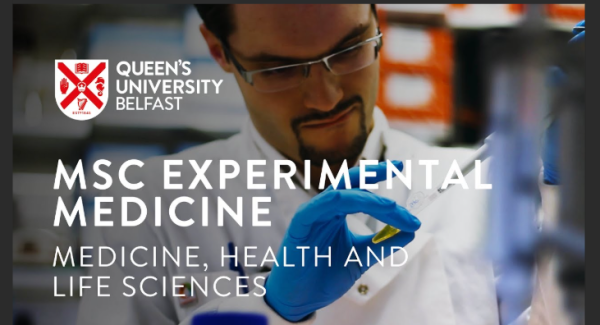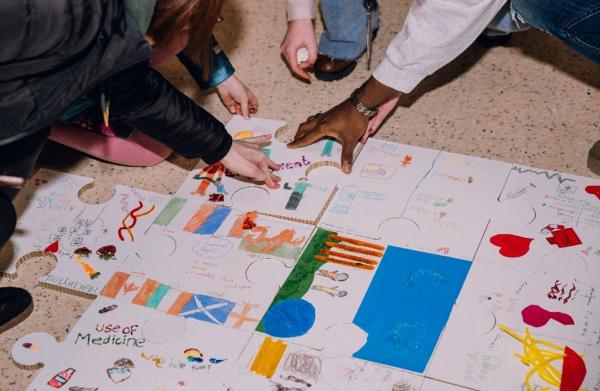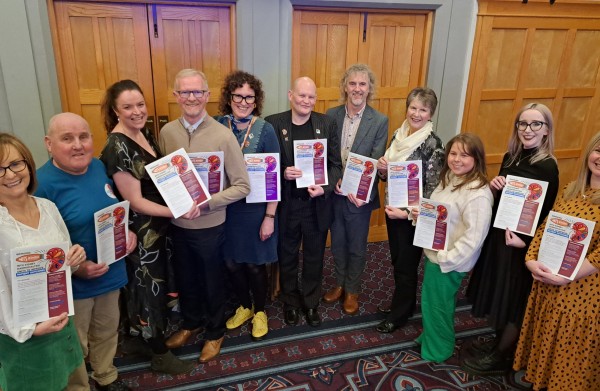Exercise training is an effective therapy for people with cancer before, during and following their treatment. Exercise can promote a number of health benefits (e.g. improved quality of life; increased fitness) that can improve cancer outcomes. It is, however, notoriously difficult to recruit individuals with cancer, to these types of trials, known as clinical exercise trials! We, the general public, all know how much exercise we are supposed to undertake each week, but we all struggle to adhere to this, due to a number of competing demands that life brings, let alone the burden of cancer treatment! A research team from the School of Nursing and Midwifery and The Patrick G. Johnston Centre for Cancer Research, at Queen’s University Belfast are interested in establishing exercise as an important component of supportive care. In an attempt to enhance recruitment numbers to these types of studies, we sought advice from people with a lived experience of cancer, either as a patient or carer, and health care professionals from the treatment pathway (i.e. oncologists; radiographers). Additionally, we are aiming to conduct a new type of study in this area, exploring the effects of exercise on prostate tumours, to see if being physically active immediately prior to treatment might sensitise the tumour to therapy, so we sought advice and feedback from clinicians and patients, to see if this was possible and how it might be implemented in practice.
To address this clinical issue, we secured seed funding from the QUB PPI Network to conduct a series of co-design workshops. By means of email or telephone conversations, we extended invitations to these workshops to patients and / or carers with a lived experience of prostate cancer, utilising the Northern Ireland Cancer Research Consumer Forum (NICRCF) and our trial databases. Invitations were also extended to trial clinicians and radiographers, using the same methods. Positively, eight men with prostate cancer and their carers, two radiographers and two clinical oncologists attended, alongside two QUB staff members and two QUB postgraduate students, from the project team. This broad sample at each workshop was ideal, with each group bringing different expertise, whether clinical, research or experience-based. The primary purpose of these workshops was to work together, to develop a research proposal that could be seamlessly integrated prior to treatment, to potentially improve the effects of radiotherapy, outcomes and cancer survivorship. These workshops allowed us to gauge interest in the idea and the potential feasibility of delivering such an intervention and allowed participants to shape and refine the trial protocol and identify potential risks / relevant side effects that might hamper implementation. We recognise the importance of co-design in achieving success and we have previously invited PPI contributors to join trial steering committees and act as co-authors on research outputs.
Format of the PPI Workshops
Treatment side effects and the risk of disease recurrence continue to pose unique clinical challenges, in patients that have received radiotherapy for prostate cancer. We sought to design a novel clinical trial whereby exercise, delivered immediately prior to radiotherapy, might better prepare the tumour (e.g. increased blood flow) and improve treatment. To date, only controlled laboratory trials using cells and animal models have produced evidence to support this concept, but the practicalities of implementing a complex intervention in humans requires key stakeholder engagement. We asked people with prostate cancer and their health care professionals for advice regarding: the exercise protocol and timing (immediately before treatment); what might encourage / discourage people to take part in exercise; and how to make the protocol more appealing and achievable. From October 2022 – January 2023, we conducted four workshops in patients / carers, clinicians and radiographers from the Belfast HSC Trust. Funding was used to pay for refreshments / lunch and each of the patients / carers for their time.
Workshop Outcomes
Overall, the co-design workshops were a success in terms of attendance and representation from each group. We recorded each workshop to allow us to be able to listen back to the conversation, to make sure nothing was missed and all views and opinions raised were given due consideration. Themes identified from workshop 1 were presented at workshop 2 and integrated findings at workshop 3. The final workshop provided an opportunity for QUB staff to present the refined protocol and invite further feedback from participants about the content. The final protocol is currently in preparation, but the proposed intervention received widespread support, with exercise recognised by the participants as an important part of treatment and recovery. Both generic and prostate-specific barriers were suggested during the workshops.
Generic concerns included:
Participant motivation and recruitment
Managing cancer symptoms such as fatigue
When and where exercise will be completed (exercise timing and location)
How long the benefits of exercise last
Exercise boredom
Prostate-specific concerns focused on:
Exercise during bladder filling and potential discomfort
Identifying suitable biomarkers to test the effects of exercise
Scheduling of exercise during radiotherapy preparation (e.g. enema)
Securing necessary support to integrate exercise on treatment days (e.g. physiotherapists / radiographers).
Ensuring all scans (i.e. simulation scans) incorporate exercise to replicate treatment conditions.
The need for future proofing our protocol against radiotherapy refinements, such as five-fraction radiotherapy (SABR)
Although barriers were articulated, solutions were suggested. It was proposed that aerobic exercise (e.g. treadmill or brisk walking) would be appropriate for men with prostate cancer, as would an exercise ‘buddy’ to manage monotony. Integrating exercise with water intake may serve as a welcome distraction during bladder filling. Finally, personalisation to each individual was a key recommendation alongside support from treating oncologists.
Lessons Learned
In terms of lessons learned, funding from the QUB PPI Network was invaluable to create an environment and supportive infrastructure for brainstorming, building rapport and empowering patients to contribute to the development of the trial protocol and the practicalities of implementing this protocol in practice. The workshops also allowed us to consolidate support for the trial from the patient population and secure complete clinical buy-in, from oncologists and health care professionals delivering treatment. This support is essential to effectively recruit and deliver such an intervention in a clinical setting. Due to our ongoing success, we would encourage PPI in every stage of designing clinical research and researchers to seek the support of cancer charities and the Northern Ireland Cancer Research Consumer Forum (NICRCF) to widen impact and involvement. Our advice to colleagues, would be to avail of this funding opportunity as a starting point to fund this enterprise of building relationships and refining ideas in practice. Since the conclusion of these workshops, we have refined our trial protocol and aim to secure future funding to conduct a feasibility trial entitled, ‘Personalised exercise training adjuvant to radiotherapy during prostate cancer treatment: A pre- / rehabilitation, phase II, feasibility randomised controlled trial (PERISCOPE)’.
Acknowledgements
We wish to thank the QUB PPI Network for seed funding to support this project. We also wish to express our gratitude to the PPI contributors, clinicians and health care professionals that participated and the NICRCF for advertising amongst its membership.
For more information, please contact Dr Malcolm Brown at m.brown@qub.ac.uk
Blog authors: Dr Malcolm Brown and Dr Gillian Prue
Related Articles


